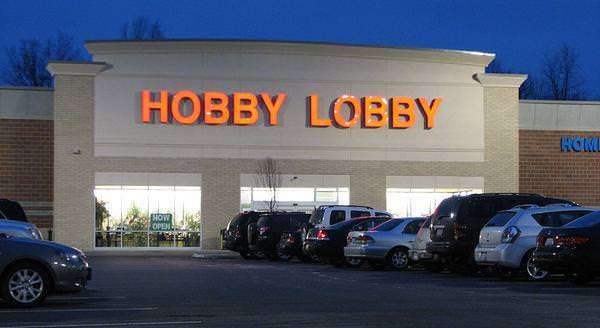Does Obamacare's Contraception Mandate Violate a Corporation's Religious Freedom? Maybe It Doesn't Matter.
Today, the Supreme Court hears oral arguments in the case against Obamacare's contraception mandate, which requires employers to provide health coverage for birth control or pay a fine. Two closely held corporations with religious owners—hobby supply chain Hobby Lobby and Mennonite-owned furniture maker Conestoga Wood Specialties—are challenging the rule as a violation of religious freedom.
Because the rule is directed at businesses and the challengers are religious owners of businesses, the case has sometimes been framed as a test of the limits of corporate personhood: Do for-profit corporate entities have the same rights to religious freedom as individuals?

The Supreme Court may end up deciding on those lines. But it doesn't necessarily have to. In an amicus brief siding with the challengers, the Cato Institute has argued that, while it's certainly interesting to wonder about whether corporate entities have the same religious freedoms as individuals, it's beside the point.
The issue isn't whether the requirement places a burden on the corporation, as an entity. Instead, Cato's brief, which was coauthored by senior fellow Ilya Shapiro, argues that the question is whether the contraception mandate places an illegal burden on the religious freedom of the individuals who own those corporations.
The government's argument is that because corporations are distinct legal entities from their owners, they should be judged separately and differently, as corporate bodies rather than as individuals with traditional individual religious freedoms. Basically, the owners might be religious, but the corporation isn't, and couldn't be.
But both Hobby Lobby and Conestoga Wood are closely held, family-run businesses. What that means is that any requirement for corporate action is also a requirement for individual action. The corporation may be legally distinct in some ways, but it can't do anything without at least one person—one individual—making a decision to do it. And in the case of Hobby Lobby and Conestoga Wood Specialties, those particular people clearly have deeply held religious convictions.
Those convictions don't disappear when making business decisions. As Cato's brief says, "those individuals do not check their religious values at the door." Those people should have the freedom to conduct their personal and work lives in a way that reflects their own deeply and sincerely held religious beliefs. When the government compels a business to do something, it's compelling individuals to do something as well.
In this understanding, it simply doesn't matter whether a corporation is legally entitled to religious freedoms. It only matters whether individuals do, and whether those individuals have the right to conduct workplace affairs in accordance with personal religious beliefs. And to believe that, you basically have to believe that free exercise protections for religious practice don't extend to the workplace.
This isn't the only useful or interesting argument for the challengers. (The Reason Foundation, which publishes Reason magazine and reason.com, signed onto a jointly authored brief strongly defending the legal concept of corporate personhood.) But it's a useful, and to my mind, reasonably compelling one, especially because of the way it counters the conventional framing. It's also one that may end up influencing the final ruling: According to The Wall Street Journal's live blog of this morning's oral arguments, Chief Justice Roberts suggested this morning that a narrow ruling, limited to closely held corporations, could resolve the issue with minimal friction.


Show Comments (318)